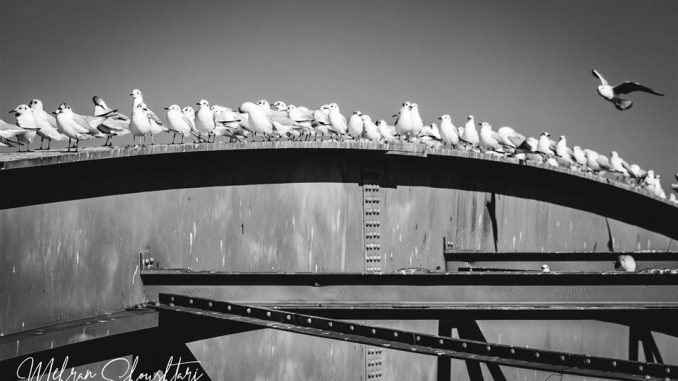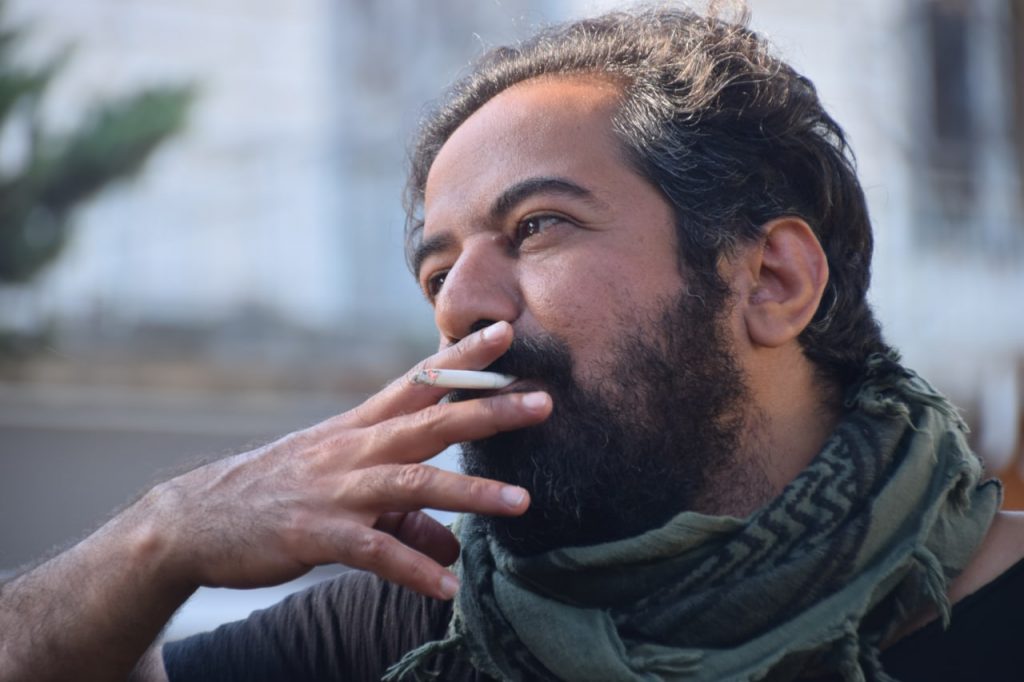
Short story by Mehdi Rabbi
Translated from original Persian by Mohammad Mobahat
Photo: Birds resting on White Bridge, Ahwaz; (c)Mehran Shoushtari
Mehdi Rabbi was born on August 19, 1980, in Ahwaz. In an introduction to his second book, he says “I write stories because I can’t help it. Writing is for me like an infinite and joyous nocturnal wander.” He holds an MA degree in Dramatic Literature from Tehran and is a doctorate candidate of the Philosophy of Art at the Azad University of Science & Research, Tehran. The following short story is from his debut collection, “That Cosy Corner on the Left,” a nominee of Golshiri and Mehregan awards and the finalist of Rouzi Rouzegari and Journalists and Press Critics’ Awards in 2007, which is already translated to Italian and published by Ponte 33. It is translated from original Persian by Mohammad Mobahat, a poet and an English Literature graduate currently based in Tehran.
I tell Roya: “let’s destroy all the bridges. How much longer are you going to continue doing this?” She says: “how much longer are you going to do it?” I say: “for as long as you continue. But for goodness sakes, finish it.” She says: “I love bridges more than anything else. Just the bridges. Of course, after you that is.”
I say: “I swear to God I’m ill. ill.”
She says: “I know. I know”
– “So let’s go to the doctor. Please.”
– “You know I’m a doctor. A head and shoulders above the rest of the doctors.”
– “So let’s pack our backpacks and go”
– “Don’t be a fool Hadi. You know that I’m crazy about travelling, but wherever we go the bridges will still be there. They exist. To me, bridges are the most solitary creatures. Despite the fact that they are prickly and uncut.”
– “We shall go somewhere where bridges don’t exist.”
– “We can’t. Because we know the bridge. So, escape from it is impossible. It is always like this. Even if your childhood friend has become an alcoholic and junky, can you forget him?! Or let me put it this way, if he has become disabled, weak and feeble. For whatever reason. In these cases, compassion is our first presumption regarding our interlocutor. So all other issues become peripheral.”
– “Roya, why do you think bridges are the loneliest and most forsaken creatures?”
– “Are you in the mood for me to tell you?”
– “You are my bridge. You are my beautiful bridge. My eternal bridge. I’m all ears.”
– “Hadi dear! Expression of affection and use of possessive pronouns are forbidden in the discussion. Agreed?”
– “Agreed.”
Before she begins to speak we reach the roadside ditch. A hundred metres further there is a small bridge over it. Our hands tied around each other’s waist, we go and cross the small bridge. Roya turns around. She gives it a wink and sends it a kiss.
– “Fear not little one, we will never jump over you. Even if your width is less than twenty centimetres. Hadi dear, there is no doubt that in being a bridge, you are my teacher, but let me tell you what is in my heart.”
– “[1]If I may, mentee, If I may”
– “Mockery and ridicule, or use of classical and archaic Farsi is forbidden in the discussion. Agreed?”
– “Agreed.”
– “Look Hadi! Bridges have always existed and will always exist. From the time when the Earth burnt in fire, to time when it sank under heavy waters. In fire and in water. In the time of the dinosaurs and giant elephants. In the time of the Neanderthal humans and wild monkeys, to intelligent humans of thirty-five thousand years ago. Imagine a time when a ginormous elephant had to pass through narrow and dangerous pathways in order to cross a river or deep valley, or a jungle cat that used rocks to cross over to the other side of the water, or an African ant that used broken branches to get itself to the ground in order to continue its errand. You see, bridges have always existed. In other words, ever since there were cracks, valleys, grabens and waters, there were bridges too.”
– “Roya, in your opinion, isn’t this issue because we don’t have enough soil to fill all the valleys and cracks?”
– “Maybe, maybe this issue is totally natural. And in any case, being a bridge and building bridges is an old way. But you have to admit that digging up mountains and pouring them into valleys reduces the beauty of Nature. To the same extent that high mountains remind us of humility and provoke our pride; dark valleys remind us of the allure of collapse, and shake our hearts. Besides, can one forget the blue waters and orange horizons of the gulf?”
– “But how do you interpret them being single? Why do you think they are abandoned and forsaken?”
– “Hadi dear, I am eternally grateful for you being my creative interlocutor in this discussion. [2]Gratitude.”
I say: “the use of street slang words are forbidden in the discussion. Agreed?”
She says: “Agreed. And about them being solitary, believe me when I say that bridges have the most tragic destiny. They are the most innocent. Oh God, why did you create them? Although I know you had no choice. Because you yourself are a bridge. but….”
Again I interrupt her
– “Talking about issues without answers is forbidden in the discussion. Agreed?”
– “Agreed”
– “Ok continue”
Roya takes her backpack off of her shoulder and hands it to me and unbuttons two of her Manteau buttons. The bright summer moon shines a silver light upon her clear skin. How beautiful this creature is. Like a white bridge with blue lights on both ends. How exhausted she is. And a little dust has settled on her, she has turned grey.
– “Yes, I was saying. In my opinion, one must start at its birth, or even earlier. But to avoid exhaustion, let’s give the example of our own city’s bridge. When you cross a bridge, where do you look Hadi?”
– “Usually, at the cracks on the taxi’s windshield, the number plate of the car in front, and maybe the driver’s feet which shift between the clutch and the brakes, and…”
– “And if you are very generous, the voluminous river flowing below the bridge, or a migratory bird perching on the cables hanging from the bridge, or the sky above, and beside the bridge, which now looks much vaster.”
– “And if I’m in a bit of a hurry, I will definitely only look towards the other side of the bridge, huge advertising billboards, oncoming cars driving fast on the opposite lane, and I think of my wallet, and how tightly it is jammed in the pocket of my jeans.”
– “Well done Hadi, that was perfect”
– “So what?”
– “No one thinks about a bridge while crossing it. To the pressure that is exerted on it. To its geniality. To how it connects. Those on this side think about those on the other side, and those on the other side think about those on this side. No one pays any attention to it, not even a river in which a small bridge has immersed its feet in, or even the mud or the fishes. It is connected to somewhere on all ends, but it belongs to none of them. No one turns round to look at the path they have come forth on a bridge. No one sleeps on a bridge. No one dances. No one stays. Except in traffic, and even then it is as if it is a favour they deign to do, and express such a condescending anxiety to leave and not stay.”
– “No one talks to a bridge. And even if people stand on it and take a moment to themselves, they will talk to the river, to the sky, the wind, and the banks on both sides, and completely forget where they are standing. They don’t realise that they owe all the beauty that they see there to the bridge. Hadi, bridges deserve sympathy. A lot.”
– “My darling Roya, accept that bridges are, in essence, sick creatures. Even when you look at them from above they look like stitches. I have seen it for myself.”
– “Hadi sometimes a fat and chubby patient can remind doctors of the right treatment. Of course, a patient that accepts to do so. One that stays alive long enough, until the doctors have fully identified all aspects of the disease. But God, how much it suffers.”
We became silent and entered the opening of our city’s bridge. We only look at the ground and the path of the bridge to the end. We go beside the bridge and tilt our heads and glance at it sideways, and then we sleep on the floor of the bridge.
We smell and kiss it. We speak to it. We get up and walk to the middle of the bridge. We again sleep next to one another and turn to face each other. I take a lock of Roya’s hair in my hand and play with it.
– “Roya, can I ask you something?”
– “Go ahead dear”
– “Between the lonely Clint Eastwood, and the debauchee Marlin Brando, which one do you prefer?”
– “Alain Delon, the womaniser.”
With her last sentence half finished, she lays a flurry of kisses on my forehead, gives out a frightening boisterous laugh and quickly runs to the other side of the bridge. I yell: “I didn’t think you knew such talk!” She runs, taking off her manteau and scarf and says: “you haven’t seen anything yet.”
It is four o’clock in the morning.
[1] رخصت (An archaic Farsi word used to ask permission to speak)
[2] مخلص (street slang)



Leave a Reply